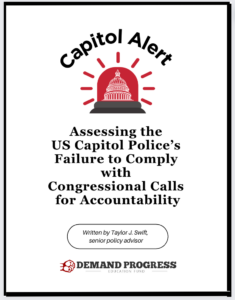TOP LINE
Recess is here, but it’s not an opportunity to breathe easier.
All 12 appropriations bills have been reported by the Senate Appropriations Committee, a first for the Senate in five years. Meanwhile, only 10 have made it out of the House Appropriations Committee gauntlet and there’s talk they won’t take up the other two. With the House wildly diverging downward from the debt agreement as the Freedom Caucus and friends push House leadership for un-enactable spending levels and poisonous policy riders, some members are predicting a government shutdown is coming. Even Republican appropriators are publicly disclosing their discomfort.
The FC was given a spreadsheet and asked to point to where they want to see cuts, and reached a $1.4T top line agreement. (McCarthy denies the existence of an agreement as he also denied a side agreement with the FC when taking power.) Meanwhile, the Senate top-line funding level is much higher and pushing for a multi-billion dollar plus-up that, entertainingly, is drawing complaints from the RSC as violating the debt deal.
Even if an agreement is reached among the factions in the House, is there time for the House to pass all of its appropriations bills before the end of September? There wasn’t time for Agriculture, which was postponed to September after being set for a floor vote this past week, leaving only one bill to have passed the House so far. The Senate surely won’t agree to the funding levels or the policy riders for the various bills, but are there enough Senate Republicans who will join with Democrats to move an appropriations bill forward in that chamber? The ability for a minority to block movement in that chamber could mean stagnation, even as Appropriators in that chamber have locked arms in favorably reporting their bills. We will be fascinated to see whether a Senate-led supplemental can work its way to the finish line. Its viability will be linked to parity.
The House has reneged on the idea of an open process around Appropriations but there will be the opportunity to offer amendments for the select few. We imagine August recess will be the time that folks go to legislative counsel to get everything drafted because appropriations bills will have to go quickly in September… assuming they go at all.
The National Defense Authorization Act is in similarly tough shape, with its text studded with far right culture war language. Mike Rogers, the Chair of the House Armed Services Committee, pooh poohed the likelihood of the Senate accepting the House’s NDAA amendments. The amendment process in both chambers, but especially the Senate, has been opaque.
Both Appropriations and the NDAA are the major opportunities to move unrelated legislation that otherwise would be caught in the Senate mire, but this year’s process may not have done so to the same extent as in prior Congresses. (You can find some of those unrelated amendments in SA 1087, which amends SA 935, which amends the NDAA. This includes a foreign lobby reform bill, classification reform, and the entirety of the Intelligence Authorization Act. Good luck). This has implications for the amount of legislative proposals to become law.
The Architect of the Capitol was the subject of one Congress-related measure that did move through the Senate NDAA process, and it can be found buried in section 10,001 of the Reed substitute amendment, SA 935. It contains the text of the Architect of the Capitol Appointment Act of 2023, a bipartisan bicameral bill described in this press release and separately introduced as H.R. 3196. The amendment establishes a commission to appoint the AOC, authorizes the commission by majority vote to re-appoint or remove the Architect, requires the Architect to appoint a Deputy Architect within 120 days and allows for the commission to do so if the Architect does not, and allows the commission to designate an Acting Architect.
The measure is necessary because the previous Architect had lost the confidence of Congress through a series of major missteps, necessitating Pres. Biden to step in and remove the AOC. As there was no deputy AOC available, the Chief Engineer, Chere Rexroat, had to step in as the acting Architect of the Capitol. As we discuss in this blogpost, many senior Legislative branch agency heads are oddly appointed by or removable only by the president, or enjoy unlimited terms of office, and this is a first step to begin to rationalize the process.
Meanwhile, the House Administration Committee and Senate Rules Committee held a joint hearing into the Capitol Police Board, the first time all the Board members have testified together in eight decades. Naturally, we released a report into USCP/Board compliance with congressional and GAO recommendations. Surprise, surprise, it didn’t look good.
We found the Capitol Police and its Board have only closed two out of 11 GAO recommendations issued over the last few years. In addition, out of nine directives from Congress, we found non-compliance and or unclear compliance with four directives, full but belated compliance with two directives, and full and timely compliance with three directives.
We are working on a detailed write-up of the hearing and we will have it for you next week.
Continue reading “First Branch Forecast for July 31, 2023: What’s done and what’s left to do”